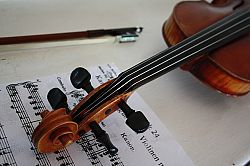

London's Royal Opera House lost a landmark case brought against them by their employee, a viola player who sustained a life-changing hearing injury after an incident during a rehearsal in 2012.
Chris Goldscheider who played his instrument during the three-hour rehearsal of the Wagner's opera "The Valkyrie", was seated right in front of the brass section. During that time he was repeatedly exposed to high levels of noise exceeding 130 dB, which could be compared to the sound of a jet engine.
After the incident, Mr. Goldscheider suffered irreversible hearing damage, caused by an "acoustic shock" including tinnitus, hyperacusis and dizziness, which forced him to give up his musical career.
The High Court heard, that some of Mr. Goldscheider's colleagues wore earplugs during the rehearsal all the time, or partially - putting earplugs in during the run up to the loud sections and taking them out straight after them, based on the marks made in their music. However, the musician claimed, that the hearing protection provided was "insufficient to prevent his exposure to a harmful amount of noise".
The Royal Opera House provides its employees with hearing protection, but does not enforce the use of it, arguing it cannot force musicians to wear hearing protection at all times as "the noise produced by the professional orchestra is not a by-product of its activities, it is the product".
Justice Nicola Davies disagreed with the statement made by the employer and ruled that the Royal Opera House has breached the Control of Noise at Work Regulations SI 2005/1643, by failing to adequately control the risk of high noise exposure, saying that the noise regulations "recognise no distinction as between a factory and an opera house", breaching their duty of care, failing to safeguard employee's health and causing the musician's condition.
Mr. Goldscheider's loss of earnings and poor health as a result of the incident could amount to at least £750,000 in compensation, although the final sum is still to be assessed.
For more information on this subject see: